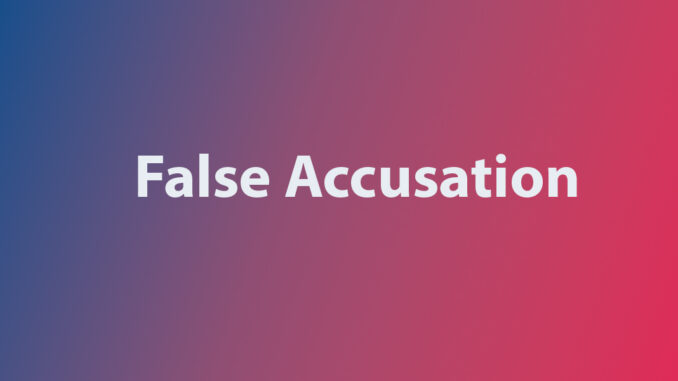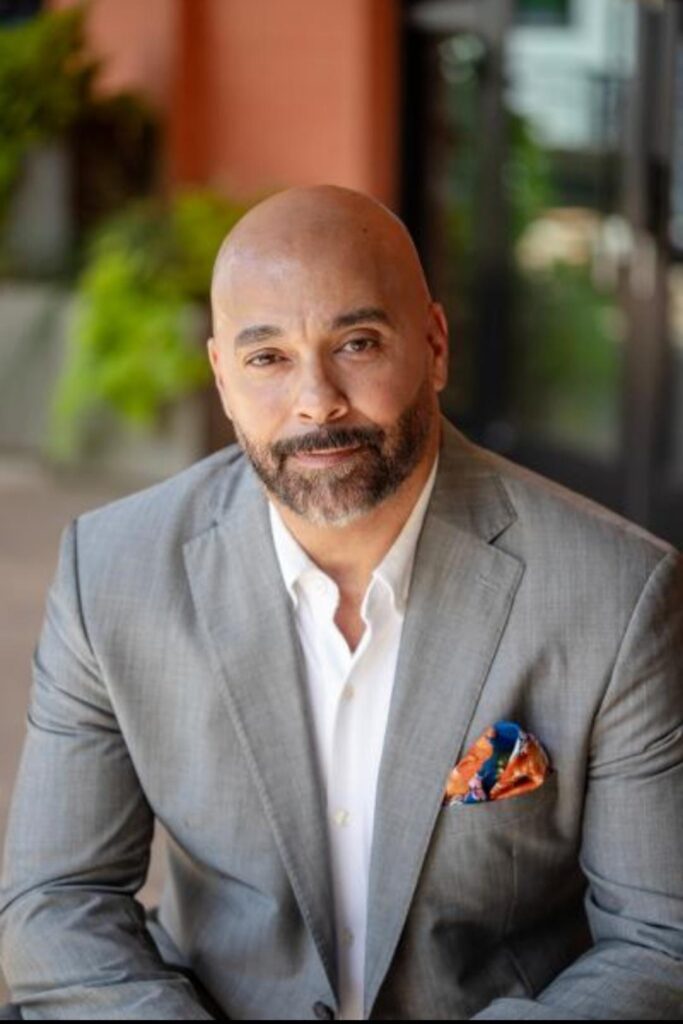
By Taroue Brooks
On September 9, advocates worldwide for the falsely accused and wrongfully imprisoned will acknowledge False Accusation Day. Dr. Patrick Graham, a false accusation victim and survivor, has become a nationally recognized advocate and will reflect on the day as one of “grace and resolve.” His journey represents what many victims encounter, but his advocacy and compassion for others have made Graham a new example of resilience. A recent investigation reveals more than a revived man, but a judicial system that aided and abetted criminal behavior. Based on his experience, Graham envisions a day when false accusations and the wrongful imprisonment of innocent people will be a federal crime with real consequences for all who participate.
According to the National Registry of Exonerations( September 2022), the number of exonerations has increased by seventy (70) percent since 2017. Unfortunately, African Americans represent under fourteen (14) percent of the population but make up fifty-three (53) percent of false accusation victims. The vast majority of these individuals are Black men. Graham is a victim who discovered a new world of injustice and the opportunity to improve it for others.
On March 22, 2018, he was falsely accused of assault after the mother of his child (Assailant) attacked him two days after he introduced her to his future wife as someone who would be in their child’s life. On the afternoon of the attack, Graham received a message from his assailant, “You set me up,” referencing his desire to introduce his future wife. Little did he know her message was a prelude and warning to events that would forever change his life and career.
A Fallen Leader
Graham was a well-respected nonprofit leader in North Carolina. He was known for his creativity and was awarded the National Urban League’s Most Innovative CEO Award, among several other regional and national accolades. Graham launched national certification initiatives for low to moderate-income residents, started a bank for non-banked communities, and led regional workforce and housing systems, including Mecklenburg County’s workforce board. However, on that fateful evening in 2018, his life was altered by a false accuser and criminal and judicial system that failed him and others.
On March 22, Graham’s assailant told police he attacked her while exchanging their child at his home in Charlotte, North Carolina. He was publicly dragged through the media, court systems, and public perceptions. Even after his exoneration on June 29, 2018, Graham found himself on a social island with no new opportunities for employment or a chance to be who he had been in that community for almost twenty years. “It is sobering to realize how easy it is to be falsely accused,” he said during one of our interviews. “My life’s work meant nothing. It was easy for others to use my intellectual capital and forget I existed.” However, a recent investigation led by Taylor and Brooks, LLC that included legal, journalists, and former Federal Bureau of Investigation members revealed a system that made false accusations, arrests, and imprisonment easier than we could imagine.
A Strange Case of Indisputable Facts
From the beginning, a trail of indisputable evidence of false statements and claims by the assailant was available to local police, the district attorney’s office, and magistrates. Graham’s entire case was based on such information that delegitimized his arrest, civil hearings, and even the trial that exonerated him. What later would be discovered as an altered audio tape of the March 22 incident from the assailant, along with text, filed police and court documents, and testimony, not only proved that she lied but that our police and justice systems failed to investigate.
Graham and his attorney did not know about the tape until an April 2018 civil hearing, with no access to a fuller version until June 2018. This version had changes to its metadata in May 2018. The June version submitted by the district attorney also missed the less-than-one-minute segment heard in April 2018, which verified it was altered on more than one occasion. The assailant’s recordings revealed she lied and misrepresented evidence, and authorities had access to it all along.
For example, the assailant told police in a written statement that she secretly recorded her interaction with Graham because she saw a gun in his bedroom. However, the audio tape revealed she began taping before she left her vehicle to enter his home. In an April 2018 civil hearing, the assailant claimed she taped to see if Graham would be truthful about the length of time he was to keep their child. Thus, she lied to the police and created another version for a judge. Neither the police nor any judge listened to the entire tape. The two versions seemed to change based on the circumstances, but it gets stranger.
The assailant suggested that Graham tried to keep her from leaving his home with the assistance of questioning from her attorney. However, the tape reveals that he requested that she leave on three occasions. The assailant is heard following Graham, berating him throughout his home. She then demands that he let her take a bench she gave him from his bedroom. Graham consented to the request, allowing her to take the bench outside the home. It disproved her allegation and indisputably demonstrated intentional misstatements with possible guidance from her attorney. Other discoveries are worse.
The assailant claimed she never attacked Graham. He attacked her. Reports used words like “busted lip,” “choking,” and other language. However, in a written statement before he was aware of the audio tape, Graham stated that the assailant attacked and punched him several times, even with a child in his arms. He also said he smelled alcohol. The audio corroborated his story. You could hear the assailant hitting him several times and Graham saying, “Stop hitting me in my face,” which proved crucial in the June 29 trial. You also hear Graham deny requests from the assailant to hand over his child throughout the tape, requesting that the assailant “come back in the morning” because he perceived her as intoxicated. Equally important, the audio and testimony, or lack of it, proved that the accusations made against Graham were false.
No testimony, not even from the assailant, addresses choking or Graham striking the assailant in the face. The assailant’s witness stated she saw no injuries. Police testimony did not demonstrate a busted lip or choking. The assailant claims she never told police Graham choked her. This is very odd.
Graham agreed to take a polygraph on three instruments with former FBI agent and expert polygrapher Jerry Hanafin. Mr. Hanafin is nationally recognized for his accuracy. He received scores of .01 and .001 for the probability of deception regarding the incident and facts mentioned above. These are the lowest probability of deception you may receive. We have other questions. How could these words be used in headlines but not revealed in testimony? Is the assailant suggesting the police made it up? Was the imagery of the terms used by the assailant or others to create bias? It is rare to see claims like these go unexplained, but it is common in false accusation cases and leaves permanent scars.
How to Move Forward
On June 29, 2018, a Charlotte-Mecklenburg court exonerated Graham, and immediate expungement procedures began due to the severity of the injustice. Something else happened that day. A district attorney’s office member approached Graham in front of several witnesses at a local restaurant. “I am glad you won that case,” she said, shaking his hand. “It should have never gone this far.” The statement touched him. “I was shocked at her boldness,” Graham said. “I could see in her eyes that she was ashamed of what happened to me and my family. It made me wonder what I should do with all of this.” Graham’s journey back to working for communities was not easy.
Graham was out of work for a year following his exoneration. In May of 2019, he joined the City of Richmond as the Senior Policy Advisor for their Community Wealth Building division. While in Richmond, Graham designed the City of Richmond’s first eviction prevention model with five surrounding counties during the COVID pandemic. He wrote the first policy in the nation that considered victims of domestic violence as health risks for emergency relocation using CARES Act funding. Graham also worked with the Federal Reserve Bank of Richmond and several partners to address the loss of social benefits to households as they increased income. He invited several Charlotte area agencies, now using and connected to tools that address the issue. In many ways, Graham’s experience and resilience helped create initiatives quickly and effectively during one of our nation’s most challenging moments. There was still something missing.
Grace and Resolve
“I felt that I was still leaving too many other victims behind,” reflecting on statistics about false accusation victims. “I had to do something for those victims living in their trauma.” Graham began investigating and writing opinion pieces and policy proposals for the falsely accused and wrongfully imprisoned. In May of 2021, he wrote one of the most republished articles of that year on false accusation cases, Screaming without Vocal Cords: Many Black Men are Falsely Accused and Silenced. It was the beginning of a personal journey of advocacy for him. His recent article inspired the statistics for this piece and the desire to make false accusations a federal crime.
And as he fights for others, I could not help but wonder why he had not taken action for himself or protected his assailant’s identity. With all his evidence, he could surely sue his assailant and others. The answer left me with ambivalent feelings but an even higher respect for him. His mother wrote him a letter, confirmed by family, dated December 10, 2020 that made an enormous request. “Patrick, you have every right to go after (assailant’s name) and put her name out there as she did yours with what you have,” referencing the evidence. “You will harm the baby and her lifestyle…I know it’s hard to let people go after what they did, but you are strong and can still fight without harming your child.” Graham said the advice left him in a “precarious position between grace and resolve.” He listened to his mother, who passed away last year.
As an advocate for Black men, I feel undecided about that motherly advice. While I understand Graham’s burden, I do not believe false accusers should get a pass, nor does he. Through his eyes, I better understand the trauma of false accusation victims, which leaves other stories we must tell. With the egregious oversights in his case by police, district attorneys, and judges, I can imagine what happens to others with fewer resources. I will invest my time with Graham and others to provide a new narrative for the falsely accused. It is an extension of my advocacy for Black men, who are often left voiceless in our struggles.
Taroue Brooks, is a dedicated advocate for Black men, boasting a distinguished career as a documentarian and journalist spanning over two decades.







